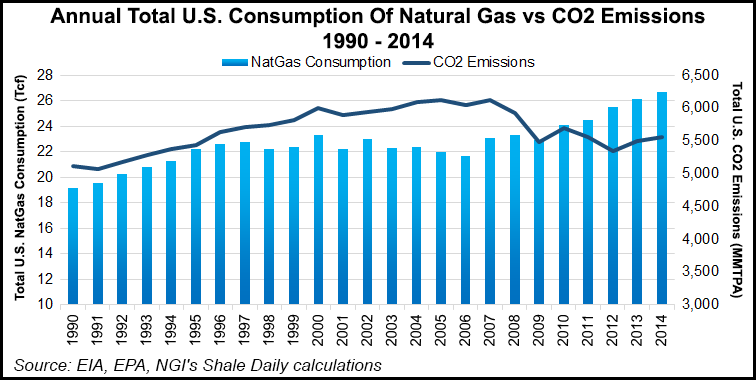Shale Daily | E&P | NGI All News Access | Regulatory
NatGas Industry Must Be Proactive About Messaging Problem, RBN Energy Analyst Says
The natural gas industry needs to change its approach if it wants to fix its messaging problem, according to Richard Smead, RBN Energy LLC managing director of advisory services.

Speaking during the 28th Annual LDC Gas Forums Midcontinent Forum in Chicago Monday, Smead offered his thoughts on how the industry should be working to court public opinion. The U.S. presidential election may feature two candidates with high unfavorability ratings, but according to Smead, the natural gas industry has its own likability problem.
“It’s hard to hire people in the natural gas industry now because they don’t want to tell their relatives,” Smead said. “We’re the next hydrocarbon…now that they’ve taken down coal, we’ve got a lot of people after us, we have a lot of people after pipelines. They still have Keystone XL blood on their teeth…popularity is a challenge, and the industry has not necessarily done itself any favors a lot of times.”
In the effort to improve public perception, perfect execution across the value chain — an area where companies have been making strides — has to be the first priority, he said.
“For a long time [messaging] has been No. 1, that our job is to go out there and explain to all these people why they’re completely wrong, and then they’ll listen to us,” Smead said. “That hasn’t worked.” Messaging has “to follow performance that you can demonstrate and that other people are recognizing. It’s much better to have a clean story that’s also true first before you go out and start telling it.
“People not in this industry do not believe a word we say, and I think everybody knows that. And that has to be fixed, meaning we’ve got to…ideally have critics say, ”Gosh, you guys are doing better.’ That’s the kind of thing that has to happen or else…the political risk of development could be a challenge.”
Smead pointed to recent headlines about coal-to-gas switching in the power sector as an example of how the industry has failed to shape the message the public receives.
As gas has overtaken coal in the power sector, carbon dioxide (CO2) emissions have decreased “a lot, and we’ve accomplished about 70% of the [Environmental Protection Agency’s (EPA)] Clean Power Plan. What’s the headline? Drumroll: ”Now gas is contributing more CO2 than coal’ [see Daily GPI, Aug. 17], not gas reduced overall CO2,” Smead said. “If coal goes to zero, this is going to be really true, and somehow the industry allowed the messaging to look like that.”
After the EPA released its landmark study on hydraulic fracturing and drinking water resources (see Shale Daily, June 4, 2015), “very few” stakeholders used the report as a basis for calls to shut down the industry, though some politicians did say it showed a need for stricter regulations, Smead said.
“Stronger regulation the industry can stand just fine,” he said. “If they have more stuff they have to comply with, a well costs more, it’s trivial compared to the efficiency gains that are dropping prices down, so the key is for the industry to be proactive in getting new regulations in place.”
Press releases aren’t going to be enough to get the public to trust the industry, he said.
“They’ll never like you, and they’ll never trust you. They will trust you behind a regulator that they trust, and you better have that in place, or else you’re just putting out press releases saying how well you’re doing,” Smead said. “That’s not going to cut it because nobody believes them.”
As for how the outcome of the presidential election might impact the industry, Smead offered a few thoughts there as well. A victory for Democratic candidate Hillary Clinton would raise questions about whether her administration would bend left to satisfy the anti-fossil fuel views of many in her party, he said.
“I think if Bernie [Sanders] had said, I want to pledge that we’ll have $5/gallon gasoline and $1 billion/MW power, you know, that should be the pledge, because then it would fix everything. There’d be a lot more money to fix it, and then everybody would stop using it,” Smead said. “If he’d said that, it would have been bad for his electoral chances, but that’s what he was saying. So, Hillary and her team understand that, but there’s obviously tension over that because of Bernie’s supporters … so we’ll have to see what she would do if she got elected.”
And if Republican candidate Donald Trump wins?
“I think it’s probably fair to say if Trump got elected, everybody would be free to go get a bulldozer and get the protesters out of the way.”
© 2024 Natural Gas Intelligence. All rights reserved.
ISSN © 2577-9877 | ISSN © 2158-8023 |
